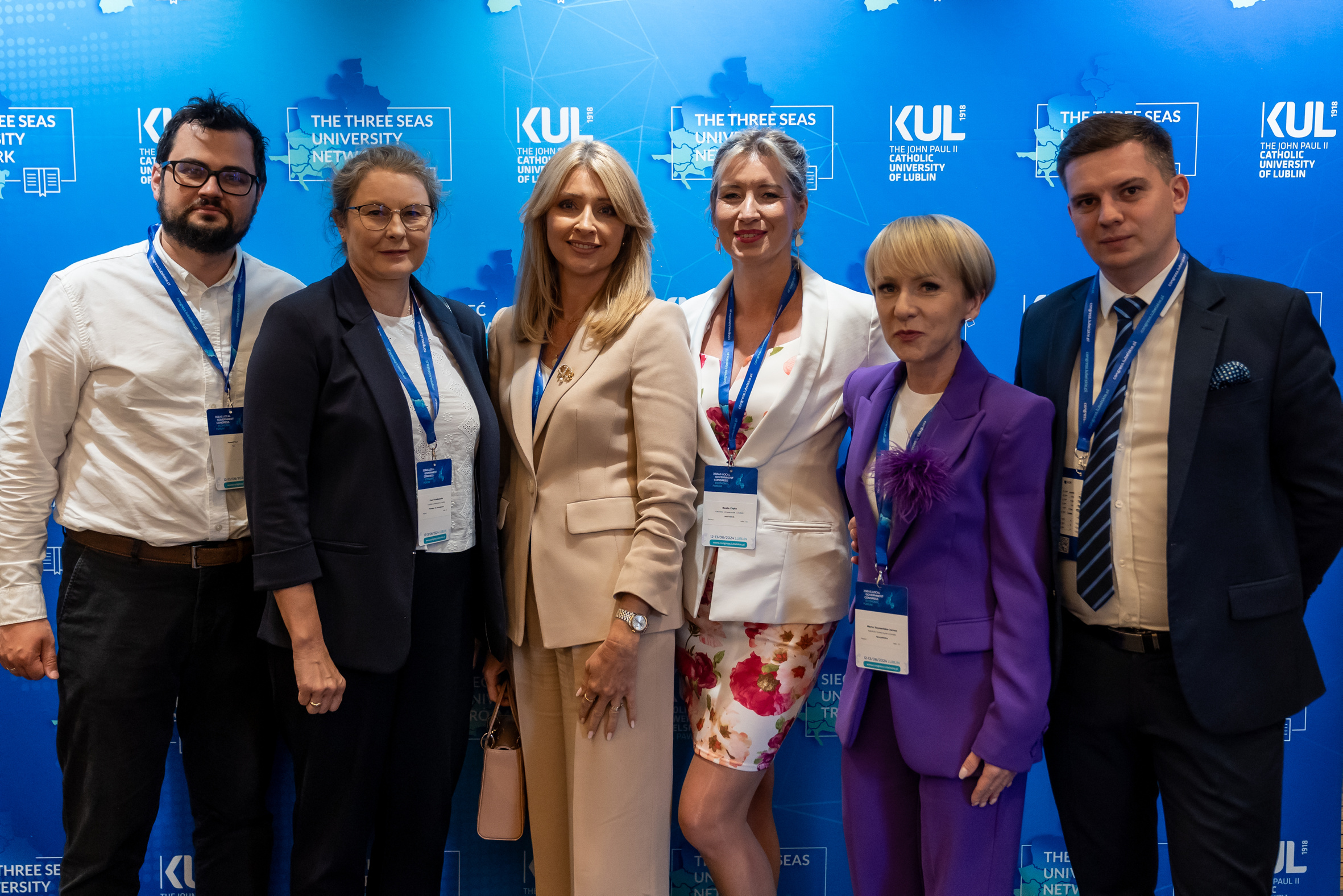On 12-13 June 2024, the conference ‘Tree Seas Universities Network – Challenges and Opportunities towards the Digital Future of Universities’ took place at the Lublin Conference Centre. The event was attended by representatives of universities from the Three Seas countries, experts
in the field of digitisation and representatives of international organisations. The aim of the conference was to discuss the key challenges and opportunities presented by digitisation in higher education and to strengthen cooperation between universities in the region.
On the first day, a ceremony was held to welcome new members to the Three Seas Universities Network: Pazmany Peter Catholic University from Hungary, represented by Dr Zsolt Almasi, Georgian American University from Georgia, represented by Prof Michael Cowgill, and the University of Presov from Slovakia, represented by Prof Mária Kardis.
The first panel, moderated by Prof. Beata Piskorska, discussed the role of digitisation in science. The panellists – Prof Mária Kardis (University of Presov), Prof Michael Cowgill (Georgian American University) and Dr Zsolt Almási (Pázmány Péter Catholic University) – presented different perspectives on the introduction of modern technologies into higher education. They discussed the potential of digitisation in making education more accessible, accelerating research and fostering international cooperation. At the same time, the risks of technological inequalities and the risk of dehumanising the educational process were highlighted.
The second panel, moderated by Prof Ursula Soler, focused on the challenges of digital security in the era of society 5.0, where technology is becoming an integral part of everyday life. Prof. Oleksandr Kuchyk (Ivan Franko National University of Lviv), Prof. Gediminas Kazėnas (Mykolas Romeris University), Piotr Mieczkowski (Digital Poland Foundation) and Prof. Istvan Hoffman (Eötvös Loránd University) emphasised the importance of developing data protection systems in the context of the increasing digitalisation of universities and public institutions. They also discussed the need for innovative regulation and education of the public on cyber security.
In the third panel, moderated by Professor Piotr Kulicki, the panellists – Dr Luka Tomazic (Alma Mater Europaea), Dr Zsolt Almási and Professor Agnieszka Lekka-Kowalik (Catholic University of Lublin) – discussed the impact of artificial intelligence (AI) on various aspects of life. Applications of AI in medicine, education and the economy were presented. At the same time, attention was drawn to ethical issues, including the responsibility of AI developers for its social consequences. Prof. Lekka-Kowalik emphasised the need for a critical approach to AI development, which would take into account the well-being of humans as an overriding value.
The fourth panel, moderated by Dr Bartosz Czajka, was devoted to the practical aspects of digitisation in public and educational institutions. Panellists included Dr Łukasz Lewkowicz (Maria Curie-Sklodowska University/Central Europe Institute), Dr Michał Dworski (Anders Institute/KUL), Andrzej Kempa (Federation of Poles in Austria) and Dr Marijuš Antonovič (Vilnius University). Successful implementation projects were discussed, as well as challenges such as infrastructural deficiencies and insufficient interoperability of systems. The importance of regional cooperation and exchange of experiences in improving digital processes was emphasised.
The fifth panel, moderated by Dr Alina Betlej, focused on the impact of digital technologies on human relations and the structure of societies. The panellists – Dr Małgorzata Ganczar (Catholic University of Lublin), Prof Piotr Boltuć (Illinois State University), Kornelia Golombek (Essen University of Technology) and Mateusz Jagieła (Cardinal Stefan Wyszyński University) – analysed how technology is changing the way we establish and maintain relationships in social and professional life. They pointed out the benefits of global connections, but also the risks of alienation and loss of interpersonal skills.
On the second day of the conference, a plenary session was held with the President of the Republic of Poland, which highlighted the importance of cooperation within the framework of the Three Seas Initiative. The opportunities provided by the university network in the context of advancing education, research and supporting local communities in addressing key challenges were discussed.
The final panel, moderated by Dr Marcin Mazuryk, focused on cooperation between universities and local governments. The panellists – Prof. Beata Piskorska (KUL), Prof. Marcin Szewczak (KUL), Prof. Iva Lopižić (Croatia), Prof. Ludvik Toplak (Alma Mater Europaea) and Prof. Grigoris Zarotiadis (Aristotle University of Thessaloniki) – discussed how science and administration can jointly support regional development through innovative research and education projects. The importance of knowledge transfer from universities to local governments as a key element of sustainable development was highlighted.
The final panel, moderated by Dr Marcin Mazurik, focused on cooperation between universities and local governments. The panellists – Prof. Beata Piskorska (Catholic University of Lublin), Prof. Marcin Szewczak (Catholic University of Lublin), Prof. Iva Lopižić (Croatia), Prof. Ludvik Toplak (Alma Mater Europaea) and Prof. Grigoris Zarotiadis (Aristotle University of Thessaloniki) – discussed how science and administration can jointly support regional development through innovative research and education projects. The importance of knowledge transfer from universities to local governments as a key element of sustainable development was highlighted.
The conference ‘Three Seas University Network – Challenges and Opportunities towards the Digital Future of Universities’ concluded by highlighting the key conclusions of two days of intensive deliberations and discussions. Participants expressed their conviction that international cooperation within the framework of the Three Seas Universities Network not only fosters the development of education, but also plays an important role in building a sustainable and innovative future for the region. It was pointed out that digitalisation is one of the most important challenges facing modern universities, but at the same time it represents an opportunity to increase the availability of knowledge, accelerate research and solve social problems more effectively. Particularly important was the emphasis on the need for a responsible approach to technology implementation, which should take into account both the technical and ethical aspects. During the conference, it was pointed out that one of the key areas of activity of the Tri-Mountain Universities Network should be the integration of academia with local governments and public institutions. One of the most important conclusions of the conference was also to underline the potential of the Three Seas Universities Network as a platform for bringing together diverse experiences and cultures in the spirit of a common goal – building modern, open and innovative academic communities. A joint initiative of universities from the Three Seas countries, strengthening cooperation not only in the field of education, but also in the field of research, may become a model for other European regions.
———————————————————————————–
The conference was co-financed from the state budget under the Excellent Science programme of the Ministry of Education and Science.
Co-financing: 108 000 PLN
Total value: 120 000 zł
Date of contract signing: 29.03.2024

